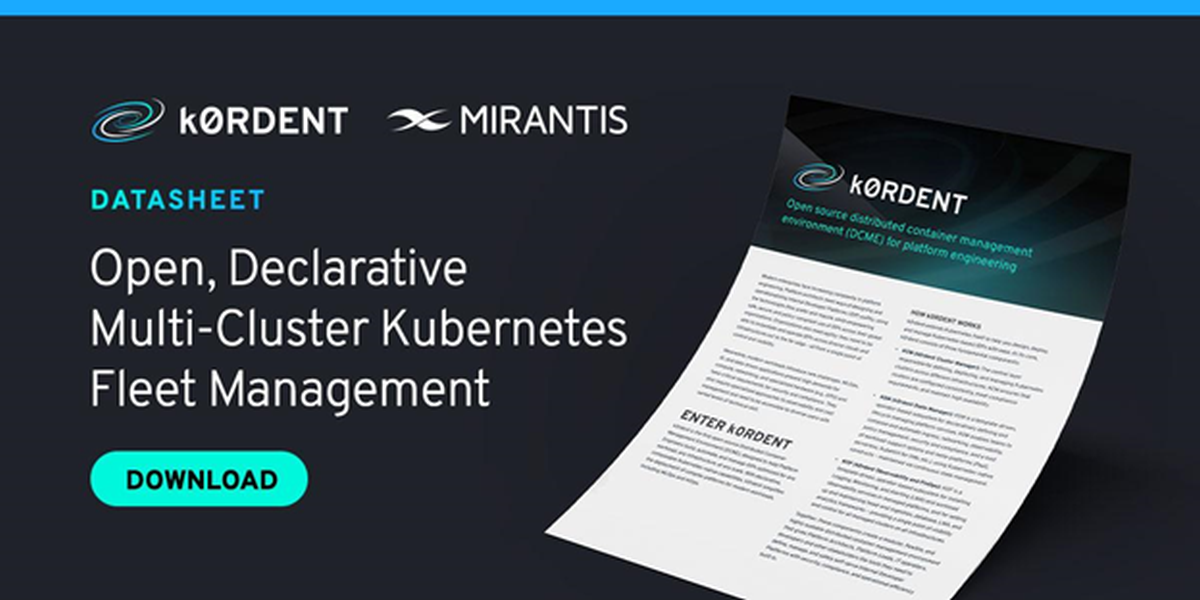Displaying items by tag: Kubernetes
DivvyCloud at KubeCon 2019 - Protect Cloud and Container Environments
VMblog visits the DivvyCloud booth during KubeCon 2019 in San Diego.
DivvyCloud software is designed to be agentless and standalone. You can apply it to any computing environment - public cloud or private software-defined infrastructure. The way DivvyCloud interacts with the host environment and Kubernetes is by way of their respective APIs. DivvyCloud continuously interacts with the APIs to gather information about the state of the hosts and the Kubernetes clusters of interest. These hosts can be Google Cloud, AWS, Azure, or a private data center that can expose infrastructure information via an API.
Once DivvyCloud is set up and targeted at the relevant host and Kubernetes clusters, it starts pulling down data about the environments - servers, security groups, load balancers, network-attached stores, S3 buckets, and any resource that is exposed via an API. This information is then unified into a single data model that represents the infrastructure and represents containment holistically.
Weaveworks at KubeCon 2019 - Build, Run and Manage Kubernetes Clusters and Applications
VMblog visits the Weaveworks booth during KubeCon 2019 in San Diego.
As the inventors of GitOps, Weaveworks demonstrated how GitOps helps a company manage and build applications on Kubernetes. With Git at the center of the operational model, application developers and cluster operators can easily spin up and manage production ready Kubernetes across different environments.
When a cluster configuration is stored in a Git repository, you can then use GitOps to recreate clusters in a predictable way. This brings advantages for building test environments and pipelines, and for reproducing clusters across teams with the same base configuration, or in improving your disaster recovery capability.
Kasten at KubeCon 2019 - Application Backup and Disaster Recovery
VMblog visits the Kasten booth during KubeCon 2019 in San Diego.
Kasten is tackling Day 2 data management challenges to help enterprises confidently run applications on Kubernetes. Kasten K10, a data management platform purpose-built for Kubernetes, provides enterprise operations teams an easy-to-use, scalable, and secure system for backup/restore, disaster recovery, and mobility with unparalleled operational simplicity.
Chef at KubeCon 2019 - Secure, Configure, Deploy Containers
VMblog visits the Chef booth during KubeCon 2019 in San Diego.
Corey Scobie, CTO at Chef, shares information about the NEW Chef and describes how they work with Kubernetes. Scobie also talks about Chef open sourcing 100% of its offerings under the Apache 2 license.
Watch the demo of Chef Habitat which enables modern application teams to build, deploy, and run any application in any environment – from traditional data-centers to containerised microservices. Chef Habitat provides built-in support for service discovery, configuration management, supervision, monitoring & health checks, rolling updates, deployment topologies, strict dependency management, and cross platform constituency.
Wallarm at KubeCon 2019 - Kubernetes-Native Security Solution
VMblog visits the Wallarm booth during KubeCon 2019 in San Diego.
Moving Kubernetes into production reliably and fast relies on security designed for the cloud. Wallarm Cloud-Native WAF delivers native security which scales with K8s and adds little if any latency.
The company showcased demos of kubernetes-native security with Wallarm delivering security automation in development (integrated in CI/CD) as well as run-time.
VMblog visits the Sauce Labs booth during KubeCon 2019 in San Diego. Sauce
Headless is all about facilitating shift-left motion. It enables development teams to get fast feedback on code and increase build efficiency by running atomic tests wherever they're needed, but especially early in the delivery pipeline. It works by leveraging headless Chrome and Firefox browsers on Linux in a Kubernetes, container-based environment. In other words, you can now put the theory behind shift-left testing into practice and test on every commit. Then you pair that with full cross-browser testing at the end of the development process, and you've got a truly holistic testing strategy.
Containous at KubeCon 2019 - Traefik and Maesh Products
VMblog visits the Containous booth during KubeCon 2019 in San Diego.
Containous is on a mission to make routing simpler so developers can focus on building instead of operating. They deliver open source routing software specifically built for a world of containers and microservices. From Traefik the open source cloud native edge proxy and TraefikEE its commercial offering, to Maesh open source SMI-compliant Service Mesh for Kubernetes, their products are fitting in the cloud native landscape with a focus on openness, simplicity, scalability, reliability and high availability.
Mirantis at KubeCon 2019 - Kubernetes-as-a-Service (KaaS)
VMblog visits the Mirantis booth during KubeCon 2019 in San Diego.
Mirantis provides a continuously delivered multi-cloud container management platform based on Kubernetes and a full stack of ecosystem technologies.
Kubernetes is creating a new way for enterprises to build and run software as they move to cloud. However, lifecycle management for a fleet of Kubernetes clusters with full stack support is an unsolved challenge. With the introduction of Mirantis Kubernetes-as-a-Service (KaaS), enterprises get zero touch, self-service Kubernetes clusters with a consistent developer experience across public clouds and on-prem infrastructure.
Lacework at KubeCon 2019 - Comprehensive Platform Approach to Security
VMblog visits the Lacework booth during KubeCon 2019 in San Diego.
Lacework brings a comprehensive platform approach to security for modern environments. As organizations operate in an environment from build time and DevOps into run time with workloads and accounts, it's far more efficient and accurate to apply a single security platform across this entire continuous set of operations.
Additionally, companies are using a mix of cloud, containers, on-prem, bare metal, and other ways to create and transact data and users. Point products for each of these scenarios does not give the level of insight required to effectively identify vulnerabilities. But having a platform provides deep visibility into activities, irrespective of how related or unrelated they are. Watch and learn how they approach security with a comprehensive, build-time to run-time approach. And see how their behavioral anomaly detection achieves more accurate understanding of risks and vulnerabilities.
A10 Networks at KubeCon 2019 - Empowering Multi-cloud & 5G
VMblog visits the A10 Networks booth during KubeCon 2019 in San Diego.
At the show, A10 Networks showcased their 5G Virtual Network Function (VNF) which can be deployed at Edge or in Core and provides enhanced security and traffic steering for 5G deployments. They offered an opportunity for attendees to see a real-time NFV solution, that demonstrates 5G capabilities for voice and video services.
Latest Videos
vmworld through the years | Infographic
-

VMworld is the premiere virtualization and cloud computing event held every year by VMware going back to 2004 when it kicked things off in San Diego. This year, the show returns to San Francisco after a three year run in Las Vegas.
Come along as VMblog takes you on a tour of VMworld through the years, rock and roll style. View the City and Attendance play bill. View the VMworld Set List. Find out how many Keynotes were hosted by which CEO. What about the bands who have played over the years? Check out the key updates made during each VMworld event and the tag lines used over the years. And find out which vendors you should be adding to your must see list at VMworld 2019.
If you enjoy our Infographic as much as we do, please consider sharing it via Social Media or by embedding it on your blog (using the embed code below and linking back to us).
Enjoy! See you there.





